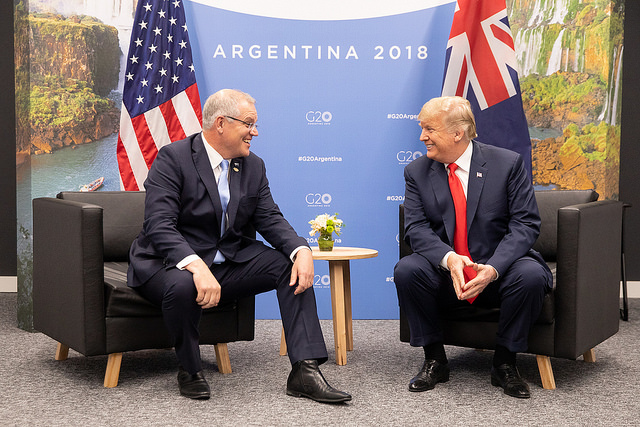ANZUS in the age of disruption

The network of US alliances built in the early years of the Cold War has proven remarkably resilient. Nowadays, it’s easy—and wrong—to take that resilience for granted. Back in 1997, Stephen Walt, analysing alliance durability, penned one of the classic articles in international relations, ‘Why alliances endure or collapse’. He argued that durable alliances turned upon hegemonic leadership; the alliance’s importance as a symbol of credibility or resolve; the disproportionate influence of particular interest groups in a country’s domestic politics; the level of alliance institutionalisation; and shared strategic identities.
Not all of those factors apply with equal weight to the ANZUS alliance. I don’t see much evidence, for example, that its durability turns upon the disproportionate influence of particular interest groups—indeed, popular support for ANZUS is almost always broad and strong. Nor is the alliance held together by institutionalisation: if anything, ANZUS is under-institutionalised. But the remaining factors—hegemonic leadership, the importance of the alliance to both the US and Australia as a symbol of resolve, and shared strategic identities—do look highly relevant.
Walt was writing when the alliances were 40 or 50 years old. Today, we’re another 20-odd years down the track. So we’re talking now about alliances that are 60 or 70 years old—and have weathered the Cold War, the ‘lost’ decade of the 1990s, and the ‘war on terror’.
Moreover, one might fondly imagine that in recent years US alliances have been given a new lease of life by the return of major-power competition to the international order. Alliances of states typically find greater purpose—because of greater threat—in an era of interstate rivalry than they do in an era of violent non-state actors, or in an era of comfortable unipolarity. So, rationally, we should be entering a period of reinvigorated Western alliances.
But we aren’t. While the evidence is anecdotal and impressionistic, US alliances seem to have become weaker in recent years. Certainly, the 45th US president’s disdain for alliance commitments—a sentiment that runs deeper than the longstanding burden-sharing issue—hasn’t helped. It’s undercut the contribution that hegemonic leadership usually makes to alliance durability. And, by reducing alliances to self-interest and transactionalism, it’s blurred the idea of shared strategic identities.
European members of NATO have begun to talk openly of security options beyond the alliance. In France, President Emmanuel Macron has recently canvassed the possibility of an ‘independent’ army to reduce Europe’s reliance on the US. German Chancellor Angela Merkel has spoken of the need for EU leaders ‘to look at the vision of one day creating a real, true European army’.
If the US chooses to play a smaller role in NATO, there would still be 28 other members of the alliance available to take up some of the slack. True, they’d find life harder, given how much Washington currently brings to NATO. But the same can’t be said of US allies in Asia, each bound to Washington in a tight, bilateral relationship. If the US decides to reduce its involvement in Asia, its bilateral allies (Japan, South Korea, Australia, the Philippines and Thailand) do not share residual alliance obligations towards each other.
Here in Canberra, the future of ANZUS has emerged as a critical, if largely unspoken, question for the future of Australian strategic policy. That’s because ANZUS has long been a one-stop shop for all of our security needs—it backstops Australian security, allows us to make a meaningful contribution to the global and regional order, grants us access to substantial quantities of finished and raw intelligence, and underpins a defence force that’s well armed and well trained. A weakened ANZUS, let alone no ANZUS at all, would leave big holes to fill in our strategic policy.
But the current problems in US alliances aren’t solely created by the occupant of the Oval Office. It’s still far from clear what we’re witnessing in the US. Is it a short-term deviation from the strategic mainstream, or a longer-term shifting of the mainstream itself? We may not know the answer to that question until sometime in the 2020s.
And regardless of the answer, a broader structural shift in the international order—towards greater multipolarity—is continuing to eat away at alliance cohesion. As Walt observes:
Alliances will tend to be less robust in a multipolar world, because the major powers will possess more options as their numbers increase, and because shifts in the distribution of capabilities will be more frequent when there are more great powers in the system. It will also be more difficult for each state to determine where the greatest threat lies, and international alliances are likely to be more flexible and fluid.
The emergence of a world in which international alliances are ‘more flexible and fluid’ would be discomfiting to Australian policymakers. ‘Flexible’ alliances carry connotations of voluntary—and optional—fulfilment of obligations; ‘fluid’ ones suggest relationships bereft of solidity.
Australia is certainly redoubling its efforts to build new strategic relationships with a range of countries in Asia. And our alliance experience hasn’t prepared us well for that venture—ANZUS’s closeness and intimacy don’t translate well to the awkward political and cultural domain that is Southeast Asia, for example. In a shifting regional security environment, Asian countries are all trying to cross the river by feeling the stones. Everyone’s treading lightly and keeping their options open.
If alliances are on the wane, and new, less onerous forms of strategic partnership on the rise, we have a major challenge ahead. Critics of ANZUS allege that it has made Australia too subservient to the US. But Australian security would be poorer without it.